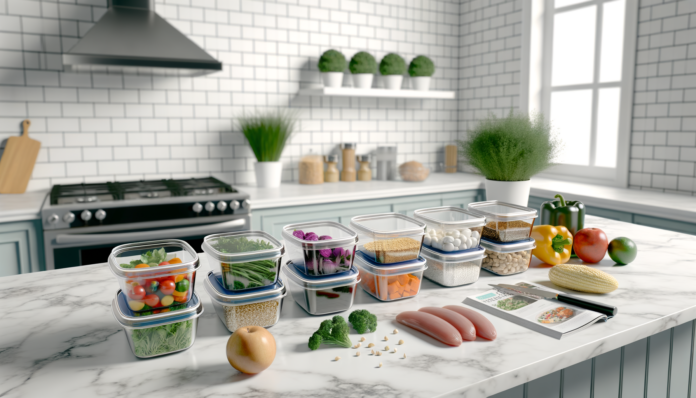Introduction to Weight Management and Meal Prep
Understanding the Importance of Weight Management
Weight management is a critical aspect of maintaining a healthy lifestyle. It involves a balance between the calories consumed and the calories expended through daily activities and exercise. Proper weight management can reduce the risk of chronic diseases such as diabetes, heart disease, and certain cancers. It also contributes to overall well-being, energy levels, and self-esteem. By understanding the importance of maintaining a healthy weight, individuals can take proactive steps towards achieving and sustaining their weight goals.
The Role of Meal Prep in a Busy Lifestyle
In today’s fast-paced world, finding time to prepare healthy meals can be a challenge. Meal prep, short for meal preparation, is a strategy that involves planning and preparing meals in advance. This approach is particularly beneficial for those with busy schedules, as it minimizes the time spent on daily cooking and decision-making about what to eat. Meal prep ensures that healthy choices are readily available, reducing the temptation to opt for less nutritious, convenience foods. It also allows for better control over portion sizes and ingredients, which is essential for weight management.
Benefits of a 7-Day Meal Prep Plan
A 7-day meal prep plan offers numerous advantages for those looking to manage their weight with minimal effort. Here are some key benefits:
- Time Efficiency: By dedicating a few hours to meal prep, you save time throughout the week, making it easier to fit healthy eating into your schedule.
- Consistent Healthy Eating: With meals planned and prepared, you’re more likely to stick to a nutritious diet, avoiding impulsive food choices.
- Portion Control: Pre-portioned meals help manage calorie intake, which is crucial for weight loss or maintenance.
- Reduced Stress: Knowing your meals are ready to go can alleviate the daily stress of meal planning and preparation.
- Financial Savings: Meal prep minimizes food waste and reduces the likelihood of spending on expensive takeout options.
- Variety and Enjoyment: A well-planned meal prep includes a variety of foods to keep your diet interesting and enjoyable, which is key to long-term adherence.
By incorporating a 7-day meal prep plan into your routine, you can enjoy these benefits while effortlessly managing your weight.
Setting Up for Success: Before You Begin
Assessing Your Nutritional Needs
Before embarking on a 7-day meal prep journey, it’s crucial to understand your unique nutritional requirements. Calories and macronutrient ratios can vary significantly based on factors such as age, gender, weight, height, and activity level. To avoid the common pitfalls of under or overeating, consider consulting with a healthcare provider or a registered dietitian. They can help you determine a daily calorie goal that promotes weight management without leaving you feeling deprived. Remember, a sustainable calorie deficit, typically between 250-500 calories, is recommended for weight loss, but this number is not set in stone and may need adjustments over time.
Grocery Shopping Tips for Healthy Choices
- Make a List: Plan your meals and snacks for the week and create a shopping list to prevent impulse buys.
- Shop the Perimeter: Fresh produce, lean proteins, and dairy are often located around the store’s edges. This strategy can help you fill your cart with whole foods.
- Read Labels: Look for items with minimal ingredients and without added sugars or excessive sodium.
- Buy in Bulk: Purchasing items like brown rice, quinoa, and lean meats in larger quantities can be cost-effective and ensure you have staples on hand.
Essential Meal Prep Tools and Equipment
Having the right tools can make meal prep more efficient and enjoyable. Invest in quality kitchen essentials such as:
- A set of sharp knives for easy chopping.
- Durable cutting boards.
- A variety of containers for storage, preferably glass for reheating purposes.
- Measuring cups and spoons for accurate portion control.
- A slow cooker or instant pot for batch cooking.
Time Management and Scheduling Your Prep
Effective meal prep isn’t just about the food; it’s also about managing your time. Allocate a block of time, typically 2-3 hours, one day a week for meal prep. Sunday is a popular choice, but choose a day that fits your schedule. Use this time to:
- Wash and chop vegetables.
- Cook grains and proteins in bulk.
- Portion out snacks into individual servings.
- Assemble and store meals in the fridge or freezer.
By following these steps, you’ll set yourself up for a week of healthy eating that supports your weight management goals with minimal daily effort.
Creating a Balanced Meal Plan
Macronutrients and Micronutrients: A Quick Guide
Understanding the basics of nutrition is essential when creating a meal plan for weight management. Macronutrients are the nutrients we need in larger quantities that provide us with energy: namely, carbohydrates, proteins, and fats. Micronutrients, including vitamins and minerals, are required in smaller amounts but are crucial for proper body function and disease prevention.
Incorporating Variety and Balance
A balanced meal plan includes a variety of foods from all food groups to ensure you’re getting the necessary nutrients. Aim to include a mix of vegetables, fruits, whole grains, lean proteins, and healthy fats in your meals. This not only ensures a wide range of nutrients but also helps to keep meals interesting and flavorful.
Portion Control for Weight Management
Portion control is a critical aspect of weight management. Eating portions that align with your energy needs can help prevent overeating and weight gain. Use measuring cups, a kitchen scale, or visual cues (like the size of your fist for a serving of vegetables) to keep portions in check.
Adapting the Plan to Dietary Restrictions
Adapt your meal plan to accommodate any dietary restrictions or preferences you may have, such as vegetarian, gluten-free, or low-carb diets. This ensures that the plan is sustainable and enjoyable for you, increasing the likelihood of long-term success.
By focusing on these key elements, you can create a meal plan that supports weight management without sacrificing taste or nutrition.
Day-by-Day Meal Prep Breakdown
Day 1: Kickstarting Your Week
Breakfast: Begin your week with a nourishing breakfast to fuel your day. Opt for a high-protein option like Greek yogurt with a handful of nuts and fresh berries to keep you satiated.
Lunch: Prepare a hearty salad with mixed greens, cherry tomatoes, cucumbers, grilled chicken, and a vinaigrette dressing. This balance of vegetables and protein will power you through your afternoon.
Dinner: For dinner, enjoy a portion of grilled salmon with a side of steamed broccoli and quinoa. The omega-3 fatty acids in salmon are great for your heart and brain health.
Day 2-3: Building Momentum
Continue with a consistent meal structure, focusing on variety to keep your taste buds interested and your body nourished.
Breakfast: Switch it up with an omelet packed with your favorite veggies and a slice of whole-grain toast.
Lunch: Try a quinoa bowl with black beans, corn, avocado, and a squeeze of lime for a zesty and filling meal.
Dinner: Bake a chicken breast seasoned with herbs and serve with roasted sweet potatoes and green beans.
Day 4-5: Over the Hump and Staying Strong
Midweek is when your prep really shines, saving you time when the week gets busier.
Breakfast: Whip up a smoothie with spinach, banana, almond milk, and a scoop of protein powder for a quick nutrient boost.
Lunch: Assemble a turkey and hummus wrap with whole-grain tortillas and a side of carrot sticks for crunch.
Dinner: Enjoy a stir-fry with tofu, a medley of colorful veggies, and brown rice to keep your energy levels up.
Day 6-7: Wrapping Up and Preparing for Success Ahead
As the week winds down, use these days to reflect on your successes and plan for the upcoming week.
Breakfast: Savor a bowl of oatmeal topped with sliced almonds and fresh fruit to start your weekend right.
Lunch: Mix it up with a chickpea salad, including tomatoes, cucumber, red onion, and feta cheese, dressed with olive oil and lemon.
Dinner: Grill a lean steak and pair it with a baked potato and steamed asparagus for a satisfying final meal of the week.
Remember, the key to effortless weight management is consistency and preparation. By following this 7-day meal prep guide, you’re setting yourself up for success and making healthy eating a part of your daily routine.
Recipes and Meal Ideas for the Week
Breakfast Options to Start Your Day Right
Starting your day with a nutritious breakfast is essential for weight management. Here are some breakfast ideas that are not only delicious but also designed to keep you satisfied and energized:
- Chocolate Peanut Butter Overnight Oats: Combine rolled oats, unsweetened almond milk, cocoa powder, and a dollop of natural peanut butter. Leave it in the fridge overnight and enjoy a ready-to-eat, protein-packed breakfast in the morning.
- Mango Green Smoothie: Blend together fresh or frozen mango chunks, a banana, baby spinach, flaxseed meal, protein powder, and unsweetened almond milk for a refreshing and filling smoothie.
- Goat Cheese Herb Omelet with Nova Lox: Whisk eggs with chopped herbs, cook in a non-stick skillet, and fill with goat cheese and smoked salmon for a gourmet start to your day.
Lunches: Quick, Easy, and Nutritious
Lunches should be something to look forward to, even when they’re made ahead. These ideas are perfect for your meal prep:
- Quinoa and Kale Salad: Toss cooked quinoa with massaged kale, diced veggies, chickpeas, and a lemony dressing for a salad that gets better as it sits.
- Chicken Cauliflower Fried Rice: Sauté cauliflower rice with cooked chicken, veggies, and a light soy sauce for a low-carb twist on a classic.
- Buffalo Chicken Rice Bowls: Top brown rice with shredded chicken tossed in buffalo sauce, add some greens and top with a light blue cheese or ranch dressing.
Dinners: Satisfying and Balanced Meals
Dinner is the time to relax and enjoy a hearty meal:
- Beef With Broccoli and Brown Rice: Stir-fry lean beef and broccoli in a savory sauce and serve over a bed of fluffy brown rice.
- Lemon Roasted Salmon With Asparagus: Bake salmon with lemon and herbs alongside asparagus for a meal that’s as tasty as it is easy to prepare.
- Turkey Meatloaf with Zucchini: Mix ground turkey with shredded zucchini, breadcrumbs, and spices for a moist meatloaf that’s full of flavor and fiber.
Snacks and Desserts: Healthy Indulgences
Snacks are an important part of your meal prep, helping you avoid hunger pangs and overeating:
- Strawberries + Almonds: Pair fresh strawberries with a handful of almonds for a snack that’s sweet, satisfying, and packed with healthy fats.
- Veggies + Hummus: Dip an assortment of sliced veggies in hummus for a snack that’s rich in protein and fiber.
- Dark Chocolate: A square or two of dark chocolate can satisfy your sweet tooth and provide antioxidants.
With these meal ideas, you’re all set for a week of healthy eating without the stress of last-minute cooking decisions. Enjoy a variety of flavors and nutrients each day, and remember that with meal prep, you’re not just feeding your body; you’re also taking care of your well-being.
Staying Motivated and Adaptable
Tracking Your Progress
One of the most effective ways to stay motivated during your weight management journey is to track your progress. This can be done by keeping a food diary, monitoring your weight, taking body measurements, or even tracking fitness levels. Seeing tangible evidence of your hard work can provide a psychological boost and help you stay focused on your goals. Use apps or a simple journal to record your meals, exercise, and milestones. Remember, progress is not always linear, so celebrate the small victories along the way.
Dealing with Plateaus and Setbacks
Weight loss plateaus and setbacks can be frustrating, but they’re a normal part of the process. When progress stalls, it’s important to reassess your meal plan and exercise routine. Sometimes, making small changes can jumpstart your metabolism. Stay patient and consistent, and consider seeking advice from a nutritionist or personal trainer if you’re struggling to overcome a plateau. Most importantly, don’t let temporary setbacks discourage you from your long-term goals.
Incorporating Feedback and Adjusting Your Plan
As you progress, you’ll learn more about how your body responds to different foods and exercises. Use this feedback to adjust your meal prep and exercise plan. If certain meals leave you feeling unsatisfied or low on energy, tweak your recipes or portion sizes. If you’re not enjoying your workouts or they’re becoming too easy, it’s time to mix things up. The key is to create a plan that is sustainable and enjoyable for you.
Finding Support and Community
Weight management can be challenging when you’re going it alone. Finding a support system or community can make a significant difference. Connect with friends or family members who are also focused on healthy living, join online forums, or participate in local fitness groups. Sharing experiences, challenges, and successes with others can provide motivation, accountability, and valuable advice. Remember, you’re not alone in this journey, and support is just around the corner.
Maintaining Your Weight Management Beyond the Week
Building Long-Term Habits
Long-term weight management is a commitment to a lifestyle change. It’s about creating habits that you can sustain for a lifetime. Start by setting realistic goals and making small changes. Incorporate more whole foods into your diet, increase your water intake, and aim for regular physical activity. Consistency is key, so find a routine that works for you and stick to it. Remember, it’s not about perfection but progress. Celebrate your victories, no matter how small, and learn from setbacks without being too hard on yourself.
Continuing Education on Nutrition and Health
Staying informed is crucial for maintaining weight management. Keep up-to-date with the latest nutritional science and health information. Follow reputable sources and consider consulting with a registered dietitian or nutritionist periodically. Understanding how different foods and activities affect your body can empower you to make healthier choices. Don’t be afraid to explore new food trends, but always approach them with a critical mind and consider how they fit into your personalized health plan.
Expanding Your Culinary Repertoire
One of the joys of a healthy lifestyle is discovering new foods and recipes. Challenge yourself to try new ingredients and cooking methods. Cooking at home allows you to control what goes into your meals and can be a fun, creative process. Explore different cuisines which often use a variety of spices and herbs that can enhance flavor without adding extra calories. Share your meals with friends and family to make the experience more enjoyable and to help inspire others to eat healthily.
Embracing a Lifestyle of Health and Vitality
Weight management is more than just the food you eat; it’s about embracing a lifestyle that promotes health and vitality. This includes managing stress, getting adequate sleep, staying hydrated, and maintaining social connections. Find activities that you enjoy and that encourage a healthy mind and body, such as yoga, meditation, or hiking. Surround yourself with a supportive community, whether it’s a fitness group, online community, or friends and family who share your health goals. By integrating these practices into your life, you’ll be better equipped to manage your weight and overall well-being in the long term.








